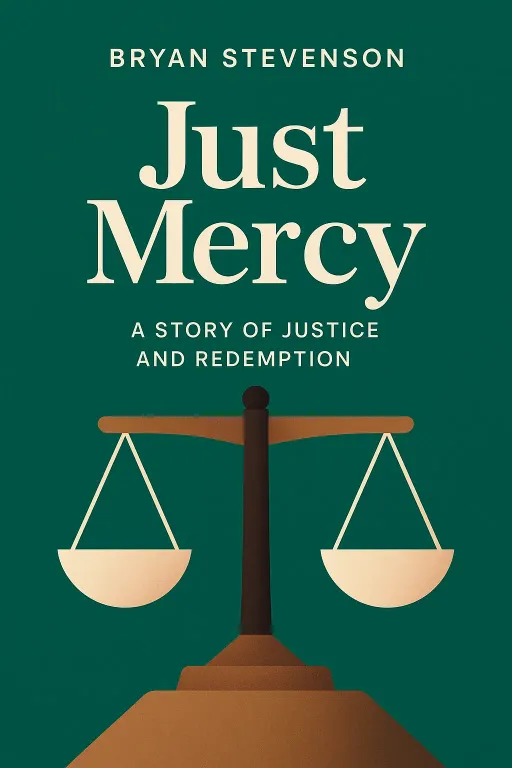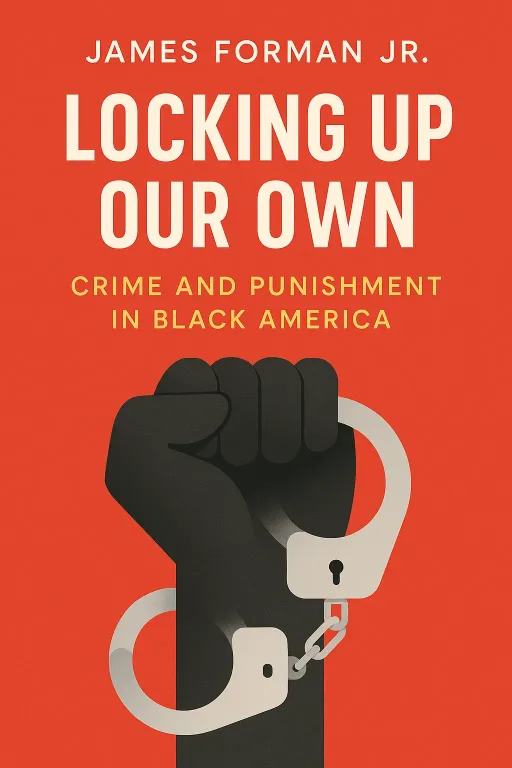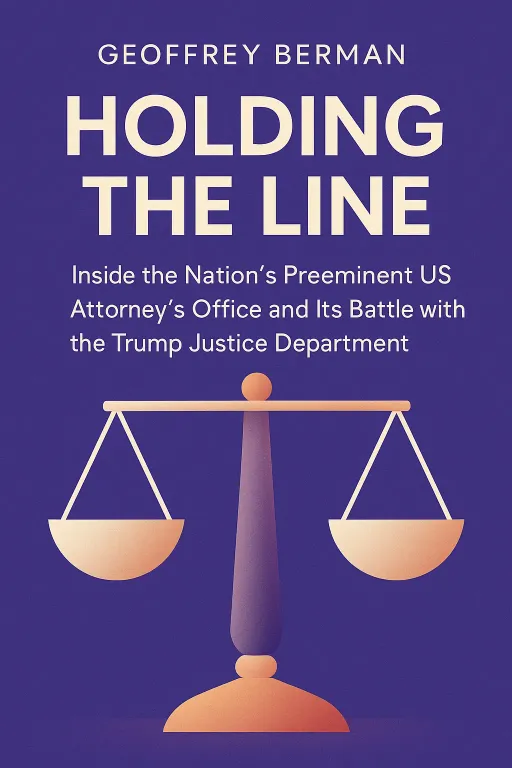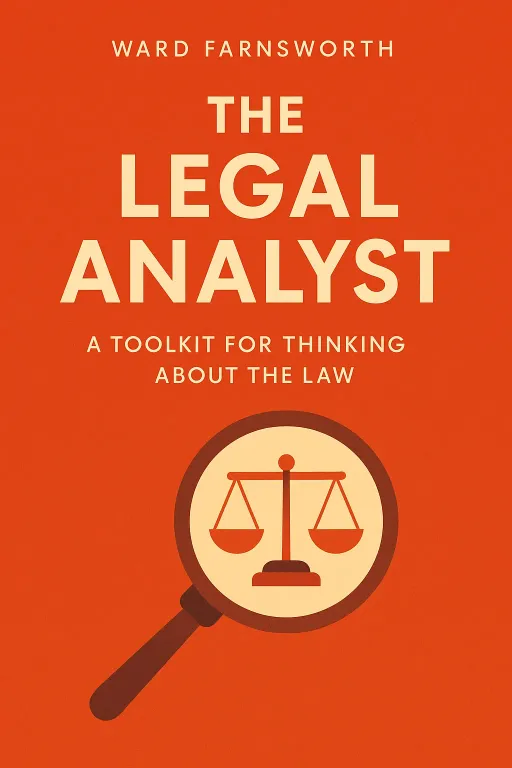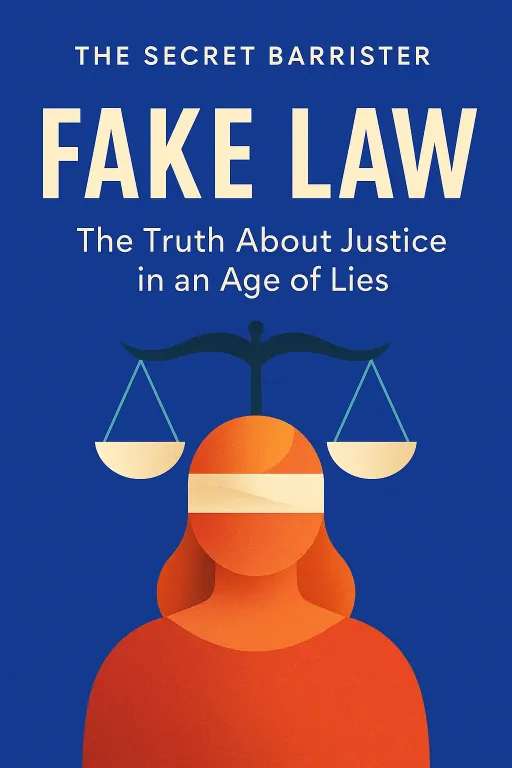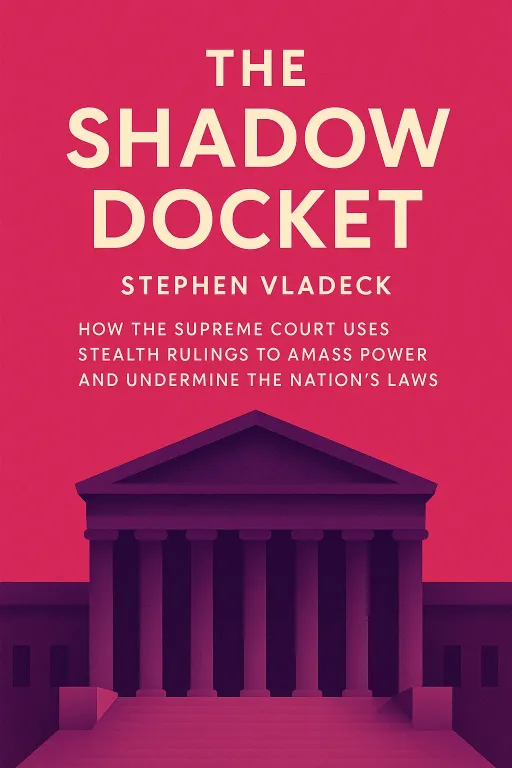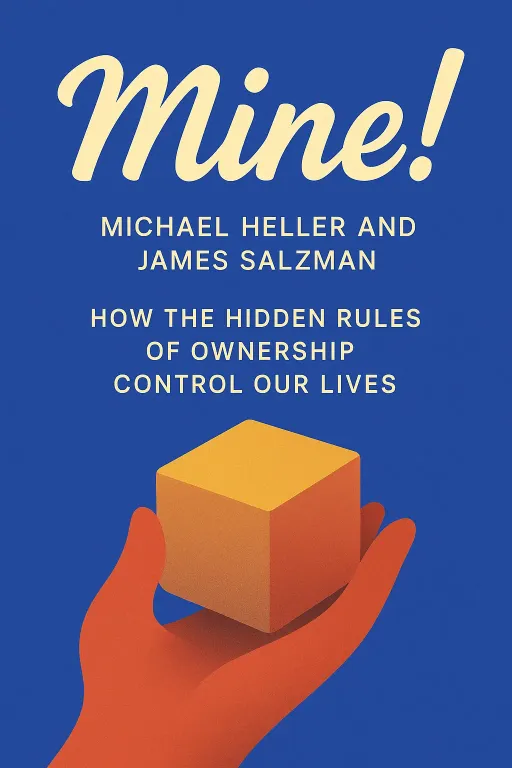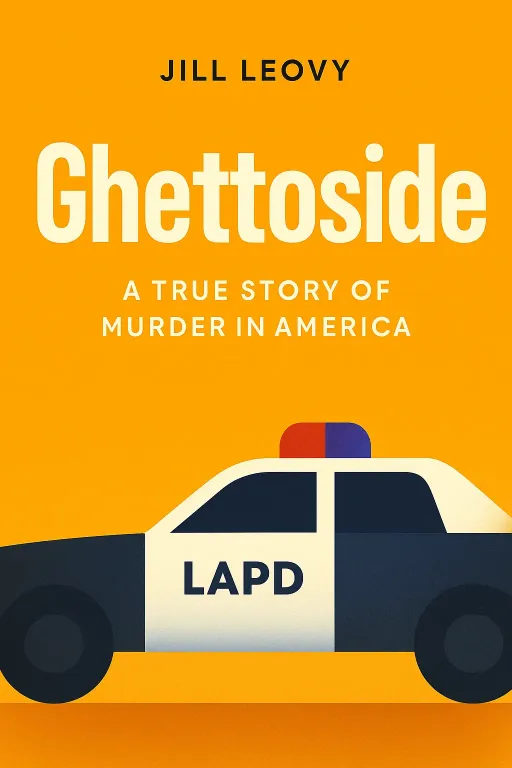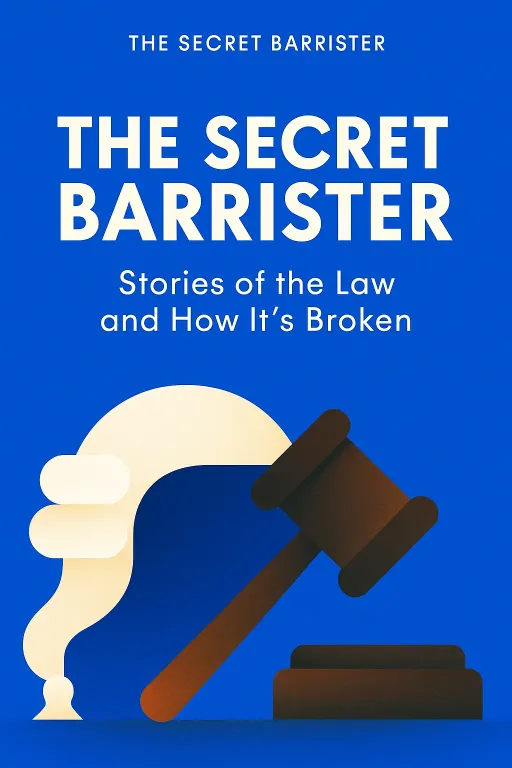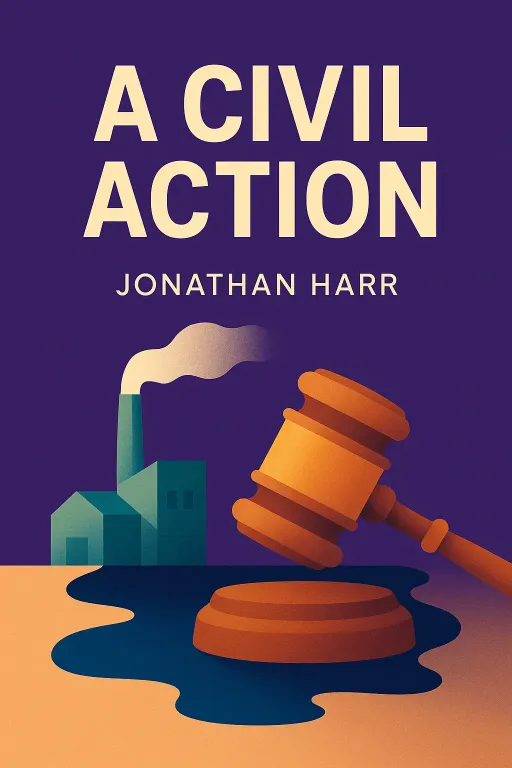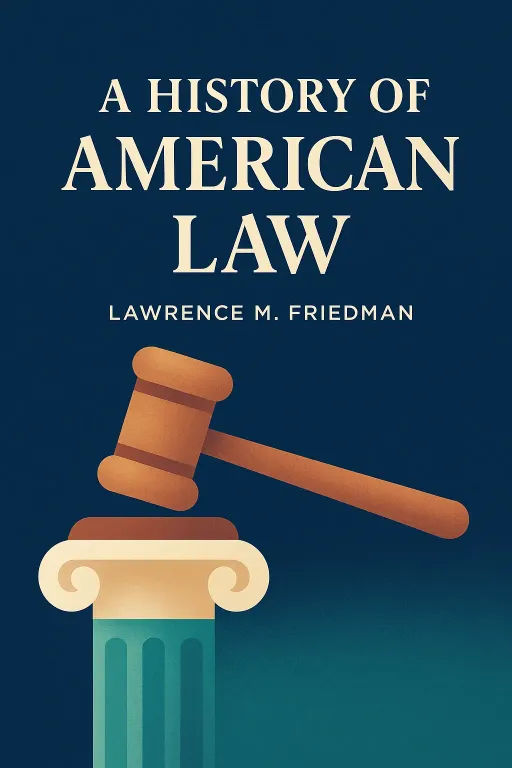
Executed Horses & Legal Typos
13 minGolden Hook & Introduction
SECTION
Michael: Alright Kevin, pop quiz. What's the most exciting thing you can think of when I say 'A History of American Law'? Kevin: A cure for insomnia? Maybe a 900-page doorstop? I'm picturing dust, powdered wigs, and sentences that are a paragraph long. Michael: That's what I thought. But what if I told you it involves public executions for horses, land grabs over typos, and the legal justification for eugenics? It's less a textbook and more a true-crime anthology of a nation's soul. Kevin: Okay, now you have my attention. An execution for a horse? You have to explain that. Michael: We will get there, I promise. Today we're diving into A History of American Law by Lawrence M. Friedman. And what makes this book a classic isn't just the wild stories. Friedman was a pioneer of the 'Law and Society' movement. He was one of the first to argue that law isn't some abstract, divinely inspired code—it's a mirror reflecting a society's messy, often contradictory, desires and fears. Kevin: A mirror, I like that. So it’s not about what the law said, but what people did with it. Michael: Exactly. And to see that in its purest form, we have to start where American law really began. Not in 1776 with the founding fathers, but in the muddy, chaotic, and deeply practical world of the American colonies.
The Law of the Land: Forgetting English Rules and Making It Up As You Go
SECTION
Kevin: I think most of us assume the colonists just packed English law in their suitcases and unrolled it here. Like, "Here's the King's law, let's get started." Michael: That's the myth. Friedman demolishes it. He shows that while they had a vague memory of English "folk-law," they were mostly making it up as they went along. The law had to solve real, immediate problems for people who were just trying to survive. There were no giant law libraries or bewigged judges on standby. Kevin: So it was more like legal duct tape than a grand system. Michael: A perfect analogy. And sometimes, that duct tape had to patch some very strange holes. Take the issue of land. In a new world, land was everything. But the colonists brought with them the ghost of English property law, which was a minefield of technicalities. Kevin: How so? Michael: In the 1690s in New Jersey, a huge legal battle erupted. Decades earlier, the governor had granted land to a man named Simon Rouse. The deed said the land was for Rouse, "his Heires or assigns for ever." Rouse later died and left the land to someone in his will. Simple enough, right? Kevin: Seems straightforward. He owned it, he willed it. Michael: Not so fast. Some clever lawyers, citing ancient English legal texts, argued that the word "or" was a mistake. To grant full ownership that could be willed away—what lawyers call a 'fee simple'—the deed needed to say "heirs and assigns." They argued that "heirs or assigns" only gave Rouse a life estate, meaning he couldn't leave it to anyone in his will. The moment he died, the land should have reverted to the governor. Kevin: You cannot be serious. A whole legal battle over 'or' versus 'and'? That's the most pedantic thing I've ever heard. Michael: It threw the entire colony into chaos! A jury actually agreed with the lawyers, which meant that potentially hundreds of land titles that used the word "or" were suddenly invalid. People were about to lose their farms over a single conjunction. Kevin: That's terrifying. What did they do? Did everyone have to hire a grammarian? Michael: This is the beauty of colonial law's pragmatism. After a bit of political maneuvering, the colony's legislature just passed a new law. It basically said, "Look, we all know what Governor Carteret meant. From now on, any grant with the word 'or' is to be treated as if it said 'and'." Problem solved. They didn't have time for centuries of English legal baggage. They just fixed it. Kevin: Wow. So the law was flexible. It was a tool, not a sacred text. But it sounds like it was also used for more than just property disputes. Michael: Oh, absolutely. The colonial court was the center of town life, and it dealt with everything. It wasn't just a place for lawsuits; it was the local government. A single county court in a place like Maryland in the 1690s would, in one session, apprentice a seven-year-old orphan, fine two guys for being drunk and cursing in public, grant someone tax relief because they were old and poor, and then hear a criminal case. Kevin: It was the DMV, social services, and Judge Judy all rolled into one. Michael: Exactly. And because the court was so central to the community, it was also the primary enforcer of social and moral order. There was no real distinction between a sin and a crime. And the punishments were designed to be public, visceral, and unforgettable. Kevin: This is where the horse comes in, isn't it? Michael: This is where the horse comes in. Friedman tells the story of Benjamin Goad in Massachusetts in 1673. Goad was found guilty of bestiality with a mare. This was seen not just as a crime, but as a profound act of spiritual corruption, an act "instigated by the Divill." Kevin: Okay, so what's the punishment for that in the 1670s? I'm guessing it's not a fine. Michael: He was sentenced to be hanged. But the court added a specific, horrifying instruction. Before Goad's execution, the mare he had abused was to be brought out and killed directly in his sight. Kevin: Whoa. Why? What did the horse do? Michael: In their worldview, the animal was now corrupted, a physical symbol of the sin. Killing it was a way of cleansing the community, of erasing the stain of this "unnatural" act. It was a brutal, public spectacle meant to horrify and warn everyone. It shows how deeply law was intertwined with religious belief and the maintenance of a very specific moral code. It wasn't about abstract justice; it was about purifying the community in the most graphic way possible. Kevin: That's a world away from a dispute over the word 'or'. It feels like the law had two faces: one incredibly practical and one incredibly dogmatic. Michael: And that's the core of colonial law. It was a patchwork. A messy, localized, deeply human system that was being invented on the fly to deal with the unique pressures of building a new society from scratch. But that ad-hoc system couldn't last forever. As the nation grew, the law had to professionalize, and the courtroom became something else entirely. It became a battleground.
The Courtroom as a Crucible: Law as the Arena for America's Fights
SECTION
Michael: As America moved into the 19th and 20th centuries, the stakes got higher. The country was industrializing, fortunes were being made, and deep social fissures were opening up. The law was no longer just about local order; it became the primary arena where the nation's biggest fights were waged. Kevin: Fights over what, specifically? Michael: Money, morality, and identity. And the people fighting these battles were a new breed: professional lawyers. In the colonies, lawyers were often distrusted. But by the mid-1800s, a law degree was a ticket to wealth and power. It was a path for ambitious young men, like a young Abraham Lincoln, to rise. But this new power of the law could be used in very different ways. It could be a tool for progress, but it could also be used to enforce some of society's darkest impulses. Kevin: You mean like codifying prejudice into law? Michael: Precisely. And there's no more chilling example than the eugenics movement in the early 20th century. There was a widespread, pseudo-scientific belief that traits like poverty, criminality, and "feeblemindedness" were hereditary. The solution, proponents argued, was to stop "unfit" people from having children. Kevin: That sounds horrifyingly familiar. How did the law get involved? Michael: States passed laws allowing for the forced sterilization of people in state institutions. And this wasn't some fringe idea; it went all the way to the Supreme Court in 1927 in the case of Buck v. Bell. Kevin: What happened in that case? Michael: Carrie Buck was a young, poor woman in a Virginia institution who had a child out of wedlock. The state, claiming she, her mother, and her infant daughter were all "feebleminded," sought to have her sterilized. They wanted to cut off the "defective" bloodline. Kevin: And she fought it? Michael: She did, all the way to the highest court. But the Supreme Court, in an opinion written by the celebrated Justice Oliver Wendell Holmes Jr., upheld the sterilization law. Holmes wrote one of the most infamous lines in Supreme Court history: "It is better for all the world, if instead of waiting to execute degenerate offspring for crime, or to let them starve for their imbecility, society can prevent those who are manifestly unfit from continuing their kind... Three generations of imbeciles are enough." Kevin: My god. That's not just a legal ruling; that's a death sentence for a family line, based on junk science. The Supreme Court signed off on this? Michael: They did. Eight to one. The law was used to give a scientific and legal gloss to a brutal form of social engineering. It's a terrifying example of how the law can become a weapon to enforce a society's prejudices. But—and this is crucial to Friedman's work—the law can also be the very tool used to fight back against that same prejudice. Kevin: How so? The same system that approved eugenics could also fight for rights? Michael: Yes, because the law is ultimately about arguments and advocacy. The outcome depends on who is wielding it. Consider the story of Myra Bradwell. In 1869, she had studied law, passed the Illinois bar exam, and was by all accounts qualified to be a lawyer. But the Illinois Supreme Court denied her admission. Kevin: On what grounds? Michael: Solely because she was a married woman. They argued a woman's duties as a wife were incompatible with the duties of a lawyer. Like Carrie Buck, she appealed to the U.S. Supreme Court. Kevin: Please tell me this story has a better ending. Michael: The immediate ending is just as infuriating. The Supreme Court upheld the denial. Justice Joseph Bradley wrote a concurring opinion that is just as chilling as Holmes's. He said, "The natural and proper timidity and delicacy which belongs to the female sex evidently unfits it for many of the occupations of civil life." He concluded that the "paramount destiny and mission of woman are to fulfil the noble and benign offices of wife and mother. This is the law of the Creator." Kevin: The law of the Creator? He's using God as a legal precedent to keep women out of the courtroom. So in both cases, the law is just dressing up social prejudice in fancy, authoritative language. Michael: Exactly. In one case, it's the language of science; in the other, the language of theology. But here's the turn. Myra Bradwell didn't give up. She became a prominent legal publisher and activist. She kept fighting. And eventually, the tide of public opinion turned. The Illinois legislature passed a law forbidding gender discrimination in professions, and years later, the very same court that had denied her admission finally granted her a law license. Kevin: Wow. So she won in the end. It took years, but she used the system to beat the system. Michael: She did. And these two stories, Carrie Buck and Myra Bradwell, sitting side-by-side, are the perfect illustration of Friedman's central thesis. The law itself is not inherently good or evil. It's a powerful, double-edged sword. It can be a cage, or it can be the key to unlock that cage. It all depends on the values of the society wielding it.
Synthesis & Takeaways
SECTION
Kevin: That's a really powerful way to look at it. The law isn't this majestic, impartial thing. It's a tool. It's a weapon. And it's up for grabs. Michael: That's the ultimate insight from Friedman's work. He shows us that American legal history isn't a steady march of progress. It's a series of brutal, messy, and deeply human fights. The courtroom is a crucible where society's competing values are melted down and reformed. Sometimes the result is horrifying, like in Buck v. Bell. Other times, it's a hard-won victory, like Myra Bradwell finally getting her license. Kevin: So, what's the takeaway for us today? Does this mean our laws are just as biased, but we're just too close to see it? Michael: I think that's exactly what Friedman wants us to ask. His history is a profound warning. It forces us to look at our own legal system—at debates over everything from corporate regulation to privacy rights to criminal justice—and ask: what are the unspoken social anxieties and cultural values being codified into law right now, often invisibly? Kevin: We think we're being logical and modern, but maybe we're just creating our own versions of the "law of the Creator." Michael: We might be. The fight over what the law is and what it should be is never over. It's the continuous, defining struggle of a democratic society. Friedman's work gives us the perspective to see that struggle for what it is—not just a dry legal process, but the very story of who we are and who we want to become. Kevin: It makes you wonder, what 'obvious' legal truths of our time will look as shocking as the case of Carrie Buck a hundred years from now? Michael: That's the question that sits with you long after you close the book. Kevin: That's a heavy thought. We'd love to hear what you all think. Drop us a comment on our socials. What modern law or legal ruling do you think future generations will be horrified by? Michael: This is Aibrary, signing off.
